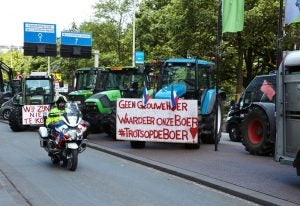Despite outcry by Dutch farmers, the European Commission has approved two Dutch plans aimed at reducing nitrogen pollution by buying out livestock farmers.
The Dutch government proposed the two plans worth a combined 1.47 billion euros (or $1.65 billion U.S. dollars) to reduce nitrogen emissions and meet EU environmental targets. Under the plans, farmers will be offered financial compensation to stop farming and sell their animals voluntarily.
In order for buyouts to be approved by the European Commission, they are required to comply with EU state aid rules, which are designed to ensure a level playing field for businesses across the EU. The rules aim to prevent member states from granting selective advantages to certain companies or sectors, which could distort competition and affect trade within the EU.

While the buyouts are currently reserved to compensate farmers who voluntarily close their farms near nature reserves, discontent over the plans has led to farmer protests and the elective defeat of Prime Minster Mark Rutte’s governing coalition, according to Reuters.
According to data from Statistics Netherlands, as of 2021, there were approximately 52,000 livestock farms in the Netherlands. Last year, Dutch agricultural exports were worth 122.3 billion euros. These farms together held around 97 million livestock animals, including cattle, pigs, poultry, and sheep.
Unfortunately, environmental issues may be the tip of the iceberg. Although the Dutch government has indicated that it will work with farmers and other stakeholders to mitigate social and economic implications for farmers and their communities, this is where things get a little blurry.
The Dutch have a history of farmer buyout programs
This isn’t the first time the Dutch government has offered buyouts to livestock farmers as part of its efforts to reduce the number of livestock in the country and address issues related to nitrogen emissions, animal welfare, and other environmental concerns.
One of the earliest examples dates back to the 1990s, when the government offered buyouts to pig farmers in an effort to reduce the size of the pig industry and address issues related to pollution and animal welfare. Similar buyouts have been offered to other livestock farmers in subsequent years.
In 2020, the European Commission approved the Warm Sanitation Scheme, a buyout program aimed at incentivizing farmers who met eligible criteria (primarily pig farmers) to stop raising livestock.
Similarly, the Subsidiary for Sustainable Agriculture, approved in 2021, was introduced by the Dutch government to reduce nitrogen emissions and address environmental concerns. While specifically targeting pig farms, win areas where nitrogen exceeded legal limits provided financial “support” to farmers who wanted to transition to other agriculture or retire.


